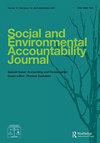Mobilising Islamic Funds for Climate Actions: From Transparency to Traceability
Q2 Business, Management and Accounting
Social and Environmental Accountability Journal
Pub Date : 2022-04-22
DOI:10.1080/0969160X.2022.2066553
引用次数: 9
Abstract
ABSTRACT Mobilising sufficient financial resources for low carbon development has led to countries integrating green bonds into their sovereign bond portfolios. However, questions remain over the efficacy and integrity of these financial instruments. Climate bonds impose additional accountability requirements that connect the money raised with actions to reduce atmospheric greenhouse gases. These requirements are given further prominence in financial instruments intended to fund climate change while complying with core Islamic values, such as the green sukuk, a Sharia-compliant alternative to traditional fixed-income investments to fund environmental projects. Climate-related financial instruments require tracking the flow of money through chains of decisions within and between organisations. This research explores how the Indonesian government, as the first sovereign state issuer of green sukuk, attempted to connect money raised from Islamic capital markets to actual reductions in greenhouse gas emissions. This required the creation of new accounting objects that connected financial data with GHG accounting at a granular level. Our analysis demonstrates how the existing accounting systems were repurposed by constructing green sukuk accounting objects that sought to connect equivalent disbursements of money with social and environmental benefits, primarily represented by reduced GHG emissions.为气候行动动员伊斯兰基金:从透明度到可追溯性
为低碳发展动员足够的金融资源,促使各国将绿色债券纳入其主权债券投资组合。然而,这些金融工具的有效性和完整性仍然存在疑问。气候债券提出了额外的问责要求,将筹集的资金与减少大气温室气体的行动联系起来。这些要求在旨在为气候变化提供资金同时又符合核心伊斯兰价值观的金融工具中得到了进一步的重视,例如绿色伊斯兰债券,这是一种符合伊斯兰教法的替代品,可以替代传统的固定收益投资,为环境项目提供资金。与气候相关的金融工具需要通过组织内部和组织之间的决策链跟踪资金流动。本研究探讨印尼政府作为绿色伊斯兰债券的首个主权国家发行人,如何尝试将从伊斯兰资本市场筹集的资金与温室气体排放的实际减少联系起来。这需要创建新的会计对象,将财务数据与温室气体会计在粒度级别上联系起来。我们的分析表明,现有的会计系统是如何通过构建绿色伊斯兰债券会计对象来重新定位的,这些会计对象试图将等量的资金支付与社会和环境效益联系起来,主要表现为减少温室气体排放。
本文章由计算机程序翻译,如有差异,请以英文原文为准。
求助全文
约1分钟内获得全文
求助全文
来源期刊

Social and Environmental Accountability Journal
Business, Management and Accounting-Accounting
CiteScore
3.90
自引率
0.00%
发文量
16
期刊介绍:
Social and Environmental Accountability Journal (SEAJ) is the official Journal of The Centre for Social and Environmental Accounting Research. It is a predominantly refereed Journal committed to the creation of a new academic literature in the broad field of social, environmental and sustainable development accounting, accountability, reporting and auditing. The Journal provides a forum for a wide range of different forms of academic and academic-related communications whose aim is to balance honesty and scholarly rigour with directness, clarity, policy-relevance and novelty. SEAJ welcomes all contributions that fulfil the criteria of the journal, including empirical papers, review papers and essays, manuscripts reporting or proposing engagement, commentaries and polemics, and reviews of articles or books. A key feature of SEAJ is that papers are shorter than the word length typically anticipated in academic journals in the social sciences. A clearer breakdown of the proposed word length for each type of paper in SEAJ can be found here.
 求助内容:
求助内容: 应助结果提醒方式:
应助结果提醒方式:


